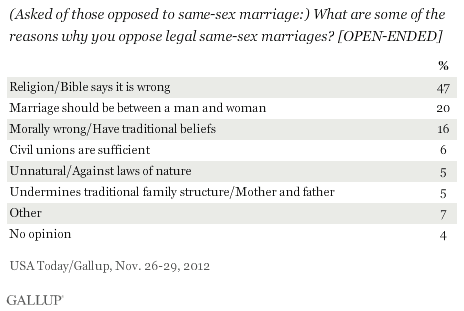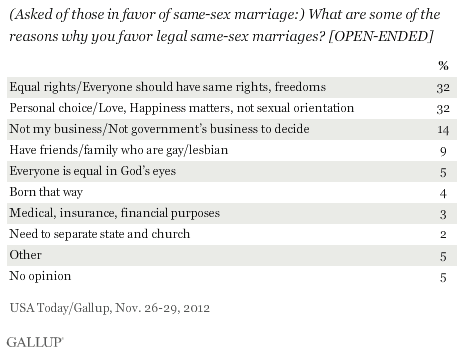December 5, 2012 - Gallup
Religion Big Factor for Americans Against Same-Sex Marriage
Overall, 53% favor legalized same-sex marriage, tying previous record high
by Frank Newport
PRINCETON, NJ -- Americans who oppose the legalization of
same-sex marriage, 46% of the adult population, are most likely to explain their
position on the basis of religious beliefs and/or interpretation of biblical
passages dealing with same-sex relations.

Other reasons given by those who oppose same-sex marriage
include the conviction that marriage should be only between a man and a woman
and the view that same-sex marriage is morally wrong or against traditional
beliefs. Smaller percentages say that civil unions should be sufficient, that
same-sex marriage is unnatural or against the laws of nature, or that same-sex
marriage would undermine the traditional family structure.
These data are from a Nov. 26-29 USA Today/Gallup poll
that explored a number of issues relating to the status of gays and lesbians in
American society. Gallup.com will report additional findings later this
week.
Supporters Cite Equal Rights and Personal
Choice
Those who favor same-sex marriage are most likely to explain
their position by saying either that it is a matter of equal rights, or that
such things should be left to the personal choice of those involved. Other
supporters say that it is not other people's business to decide who should get
married, or that they personally know people who are gay or lesbian.

Fifty-Three Percent Favor Same-Sex Marriage; Ties Record
High
Overall, 53% of Americans believe same-sex marriages should be
recognized by law as valid, with the same rights as traditional marriages --
tying with May 2011 as the highest level of support Gallup has found since it
began tracking the issue in 1996. Forty-six percent say such marriages should
not be legal.

More than two-thirds of Americans were opposed to same-sex
marriage in 1996 when Gallup first asked about the issue, and the majority were
opposed as recently as 2010. But half or more of Americans have supported
same-sex marriage in three out of the four Gallup surveys conducted since May
2011.
Young Americans, Democrats, and Those Who Don't Attend
Church Most in Favor
Seven in 10 weekly church attenders are opposed to same-sex
marriage, while seven in 10 of those who seldom or never attend church are in
favor. This dramatic difference in position on same-sex marriage based on
religiosity underscores the power of the relationship between religion and
attitudes toward moral and values issues in America today.

The biggest differences by age in support for same-sex marriage
occur at the extremes, with 34 percentage points separating 18- to 29-year-olds
and those 65 and older. Support among Americans aged 30 to 64 is basically
split, mirroring the national average.
Republicans are the most opposed to same-sex marriage, while
Democrats are the most in favor. Independents tilt toward support -- close to
the national average. This finding relates to the fact that party identification
in the U.S. today is correlated with religiousness, with
Republicans substantially more likely to be religious than independents or
Democrats.
Implications
This survey confirms a significant change in American attitudes
toward same-sex marriage -- with support rising to 53% today from 42% eight
years ago and 27% in 1996. The issue is still divisive, however, particularly
along age and political lines. Americans under the age of 30 and Democrats
highly favor same-sex marriage, while those aged 65 and older and Republicans
significantly oppose it.
These results also underscore the importance of religion as a
correlate of these attitudes. A simple indicator of religiosity -- religious
service attendance -- is a powerful predictor of views on same-sex marriage,
with seven in 10 of those who attend weekly saying they are opposed, and seven
in 10 of those who seldom or never attend saying they are in favor.
Significantly, when asked to explain their position, almost half of those
opposed to same-sex marriage focus on religion, including the statement that
such a position follows the respondent's religious beliefs, or that it is based
on their interpretation of the Bible.
Survey
Methods
Results for this USA Today/Gallup poll are based on telephone
interviews conducted Nov. 26-29, 2012, with a random sample of 1,015 adults,
aged 18 and older, living in all 50 U.S. states and the District of
Columbia.
For results based on the total sample of national adults, one can say with
95% confidence that the maximum margin of sampling error is ±4 percentage
points.
Interviews are conducted with respondents on landline telephones and cellular
phones, with interviews conducted in Spanish for respondents who are primarily
Spanish-speaking. Each sample includes a minimum quota of 400 cellphone
respondents and 600 landline respondents per 1,000 national adults, with
additional minimum quotas among landline respondents by region. Landline
telephone numbers are chosen at random among listed telephone numbers. Cellphone
numbers are selected using random-digit-dial methods. Landline respondents are
chosen at random within each household on the basis of which member had the most
recent birthday.
Samples are weighted by gender, age, race, Hispanic ethnicity, education,
region, adults in the household, population density, and phone status (cellphone
only/landline only/both, cellphone mostly, and having an unlisted landline
number). Demographic weighting targets are based on the March 2011 Current
Population Survey figures for the aged 18 and older U.S. population. All
reported margins of sampling error include the computed design effects for
weighting.
In addition to sampling error, question wording and practical difficulties in
conducting surveys can introduce error or bias into the findings of public
opinion polls.
Copyright © 2012 Gallup, Inc. All rights
reserved.